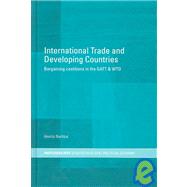
Note: Supplemental materials are not guaranteed with Rental or Used book purchases.
Purchase Benefits
What is included with this book?
| List of illustrations | xii | ||||
| Series preface | xiii | ||||
| Acknowledgements | xv | ||||
| Abbreviations | xvii | ||||
| Introduction | 1 | (9) | |||
|
1 | (2) | |||
|
3 | (3) | |||
|
6 | (1) | |||
|
7 | (3) | |||
| 1 Bargaining together: why and how? | 10 | (24) | |||
|
10 | (3) | |||
|
13 | (4) | |||
|
17 | (12) | |||
|
29 | (4) | |||
|
33 | (1) | |||
| 2 Coalitions in the GATT and the entry of services | 34 | (20) | |||
|
34 | (5) | |||
|
39 | (5) | |||
|
44 | (9) | |||
|
53 | (1) | |||
| 3 Bloc diplomacy: the Informal Group and the G-10 | 54 | (29) | |||
|
54 | (15) | |||
|
69 | (7) | |||
|
76 | (4) | |||
|
80 | (3) | |||
| 4 Alliance diplomacy: the issue-based, crossover coalitions of G-20 and Café au Lait | 83 | (22) | |||
|
84 | (4) | |||
|
88 | (8) | |||
|
96 | (4) | |||
|
100 | (3) | |||
|
103 | (2) | |||
| 5 Combination diplomacy: issue-based blocs and sub-sectoral crossover alliances | 105 | (16) | |||
|
106 | (4) | |||
|
110 | (10) | |||
|
120 | (2) | |||
|
122 | (2) | |||
|
124 | ||||
| 6 Evolved alliances: the Cairns Group and Friends of Services Group | 121 | (34) | |||
|
128 | (4) | |||
|
132 | (9) | |||
|
141 | (6) | |||
|
147 | (4) | |||
|
151 | (2) | |||
|
153 | (2) | |||
| 7 Regionalism: a springboard for bargaining? | 155 | (22) | |||
|
156 | (4) | |||
|
160 | (9) | |||
|
169 | (5) | |||
|
174 | (3) | |||
| 8 Coalitions of the new round: developing countries at Seattle and Doha | 177 | (19) | |||
|
178 | (7) | |||
|
185 | (6) | |||
|
191 | (3) | |||
|
194 | (2) | |||
| 9 Conclusion | 196 | (13) | |||
|
196 | (4) | |||
|
200 | (6) | |||
|
206 | (3) | |||
| Notes | 209 | (13) | |||
| Bibliography | 222 | (13) | |||
| Index | 235 |
The New copy of this book will include any supplemental materials advertised. Please check the title of the book to determine if it should include any access cards, study guides, lab manuals, CDs, etc.
The Used, Rental and eBook copies of this book are not guaranteed to include any supplemental materials. Typically, only the book itself is included. This is true even if the title states it includes any access cards, study guides, lab manuals, CDs, etc.